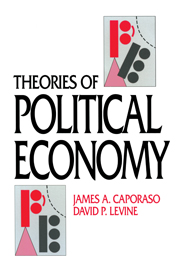Book contents
- Frontmatter
- Contents
- Preface
- Theories of political economy
- Introduction
- 1 Politics and economics
- 2 The classical approach
- 3 Marxian political economy
- 4 Neoclassical political economy
- 5 Keynesian political economy
- 6 Economic approaches to politics
- 7 Power-centered approaches to political economy
- 8 State-centered approaches to political economy
- 9 Justice-centered theories
- Conclusion
- Bibliography
- Index
6 - Economic approaches to politics
Published online by Cambridge University Press: 05 June 2012
- Frontmatter
- Contents
- Preface
- Theories of political economy
- Introduction
- 1 Politics and economics
- 2 The classical approach
- 3 Marxian political economy
- 4 Neoclassical political economy
- 5 Keynesian political economy
- 6 Economic approaches to politics
- 7 Power-centered approaches to political economy
- 8 State-centered approaches to political economy
- 9 Justice-centered theories
- Conclusion
- Bibliography
- Index
Summary
Let us start with two broad definitions of economics.
Economics is a study of mankind in the ordinary business of life; it examines that part of individual and social action which is most closely connected with the attainment and with the use of the material requisites of wellbeing.
(Alfred Marshall, Principles of Economics, ([1890] 1930:1)Economics is the science which studies human behavior as a relationship between ends and scarce means that have alternative uses.
(Lionel Robbins, An Essay on the Nature and Significance of Economic Science,1932:16)These two definitions, the former stressing material well-being and the latter efficient allocation, recall two of the three approaches to economics discussed earlier in the book. The former definition, offered by Marshall in Principles of Economics, conforms to the idea of economics as material provisioning to satisfy needs and wants. If we broaden Marshall's definition to include nonmaterial means, we have an idea of the economy, or economic processes, that is concerned with wealth, its production, distribution, and consumption. The latter definition has to do with adapting means to ends. Economics here is defined more abstractly, in methodological terms. Economics does not refer to particular kinds of activities but to a distinctive way of adapting resources to ends.
It is this second definition that becomes central to this chapter. Once we abstract economics from economic activities, using the term to characterize situations of choice and scarcity, the door opens to an expanded domain of economics.
- Type
- Chapter
- Information
- Theories of Political Economy , pp. 126 - 158Publisher: Cambridge University PressPrint publication year: 1992
- 1
- Cited by



